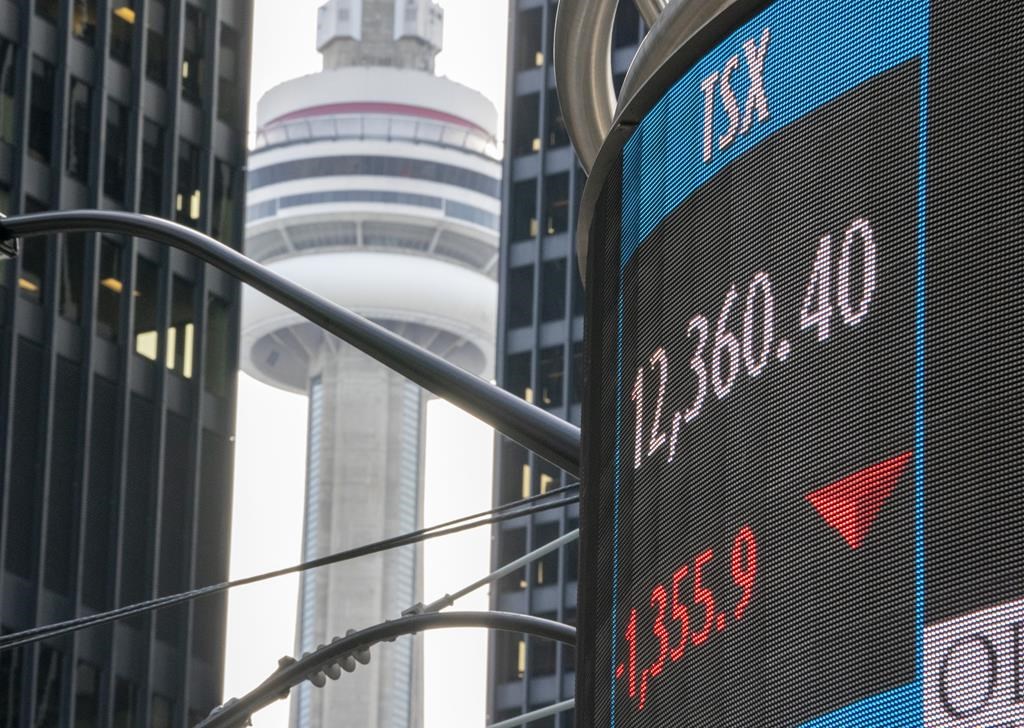TORONTO — Canada’s main stock index moved into correction territory to start the trading week as hot U.S. inflation accelerated worries of a supercharged interest rate hike this week that could help push the U.S. economy into recession.
The S&P/TSX composite index had its second-worst day of the year by closing down 532.26 points or 2.6 per cent to 19,742.56 after falling as much as nearly 672 points in earlier trading.
U.S. stock markets suffered larger declines as the S&P 500 joined Nasdaq in bear market territory by falling more than 20 per cent from their recent highs, while the Dow Jones industrial average, like the TSX, was in correction territory with a 10 per cent drop.
In New York, the Dow lost 876.05 points to 30,516.74. The S&P 500 index was down 151.23 points to 3,749.63, while the Nasdaq decreased 530.79 points or 4.7 per cent to 10,809.23.
Markets continued Friday’s moves lower after U.S. inflation data for May showed no signs of stabilization by reaching the highest level in 40 years at 8.6 per cent, higher than what economists expected.
That’s setting up anticipation that the U.S. Federal Reserve could announce a 75 basis point rate increase on Wednesday to tackle inflation, up from earlier forecasts for a 50 point increase. A basis point is a hundredth of a per cent.
“That’s obviously causing investors to take a more cautious approach to how they’re thinking about valuations and how they’re thinking about the challenging business environment going forward,” said Ryan Crowther, portfolio manager at Franklin Templeton Canada.
There’s also more and more talk of a recessionary environment, he said in an interview.
“And that’s getting more priced into stocks as we ratchet down valuations.”
Crowther said bear markets can bring great buying opportunities for those with a long time horizon and who own shares in businesses with solid fundamentals and cash flow.
All 11 major sectors on the TSX were lower with six dropping by more than two per cent.
Health care shed 5.1 per cent as Aurora Cannabis Inc. shares dropped 10.7 per cent.
Materials decreased 4.8 per cent amid a drop in metals prices that hampered producers such as Oceangold Corp., which lost 11.6 per cent.
The August gold contract was down US$43.70 at US$1,831.80 an ounce and the July copper contract was down 8.3 cents at US$4.21 a pound.
The information technology sector dropped 3.6 per cent as bond yields rose even higher as investors anticipate aggressive interest rate increases to come.
The 10-year U.S. Treasury climbed to an 11-year high of 3.373 per cent in late afternoon while the Canada 10-year government bond was 3.519 per cent. Two-year U.S. bond yields temporarily inverted with 10-year bond yields, a potential sign of recession.
Lightspeed Commerce Inc. plunged 14.4 per cent while Hut 8 Mining Corp. was down 10.5 per cent and Shopify Inc. was 9.4 per cent lower.
Although crude oil prices were relatively flat on the day, the energy sector lost 3.1 per cent with Vermilion Energy Inc. down 5.8 per cent.
“A strong oil price isn’t enough to offset that sort of across-the-board risk-off sentiment that’s taking place today,” said Crowther.
The July crude contract was up 26 cents at US$120.93 per barrel and the July natural gas contract was down 24.1 cents at US$8.61 per mmBTU.
The Canadian dollar traded for 77.77 cents US compared with 78.27 cents US on Friday.
Monday also saw cryptocurrencies, which accelerated during the pandemic when interest rates were low, drop back to where they were in late 2020. Bitcoin lost 12.4 per cent to US$23,255 from last year’s peak of US$68,991.
“Part of the enthusiasm around crypto and Bitcoin was the idea that you’d have an asset class that would perform well in a risk-off environment, and instead we’ve seen the opposite, with a lot of those cryptocurrencies seeing more volatility to the downside and not protecting value the way that people would have hoped,” added Crowther.
The selloff prompted the crypto exchange called Celsius to halt withdrawals on Sunday evening. Celsius is partly owned by the Caisse de depot et placement du Quebec.
The pension fund manager said in an email that Celsius has been impacted by very difficult markets in recent weeks that have been accompanied with heavy crypto withdrawals.
“Celsius is taking proactive action to uphold its obligations to its customers (Celsius community) and has honoured its obligation to its customers to date. Our team is closely monitoring the situation, stated spokeswoman Kate Monfette.
This report by The Canadian Press was first published June 13, 2022.
Companies in this story: (TSX:VET, TSX:LSPD, TSX:HUT, TSX:SHOP, TSX:OGC, TSX:ACB, TSX:GSPTSE, TSX_CADUSD=X)


